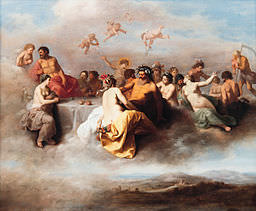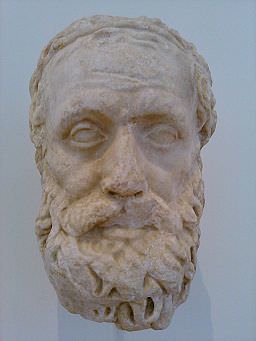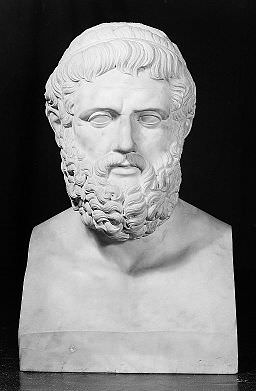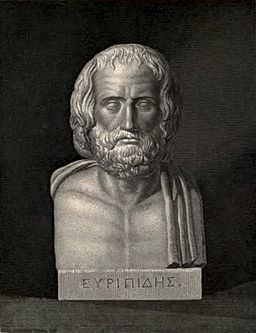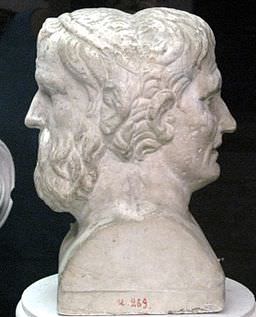希腊历史、戏剧和文化中的哲学起源
章节大纲
-
Greek Culture and History
::希腊文化和历史The Greeks wanted a good life. The question then, as well as now, is how to know what the good life is? How does one recognize the good life? The "good" itself? How does one gain the knowledge needed to pursue the good life and distinguish it from another that is less good or even not good but appearing as good for those who are foolish, impetuous and ignorant, lacking in wisdom?
::希腊人希望过上美好的生活。当时和现在的问题是,如何知道好生活是什么?一个人如何认识好生活?“好”本身?一个人如何获得追求好生活所需的知识,又如何将之与不那么好或甚至不是好,但却表现为对那些愚昧、冲动和无知、缺乏智慧的人有好处的人区分开来?The Greeks at the time of Socrates and Plato were undergoing a major change in the way in which they would think about the world, themselves and reality itself. Greek culture rose to great heights in the period from 525 BC to 350 BC, the period that brackets the lifespan of Socrates and Plato. In this period Athens, the Greek city-state, would rise to the height of its political and military powers and would come to represent the height of Greek cultural achievement as well. The Greeks during this time, and particularly in Athens, were moving from an oral to a literate culture and from a foundation of religious belief and mythology to another based upon the inventions and creations of artistic endeavor and rational thought.
::苏格拉底和柏拉图时代的希腊人在思考世界、自身和现实的方式方面正在发生重大变化。希腊文化从公元前525年升至公元前350年这一将苏格拉底和柏拉图的寿命期括在公元前350年的高度。 在此期间,希腊城州雅典将升至其政治和军事实力的高度,也将代表希腊文化成就的高度。 在此期间,希腊人,特别是在雅典,正在从口述文化向识字文化转变,从宗教信仰和神话学的基础向基于艺术努力和理性思想的发明和创造的另一种基础转变。The Greeks, prior to Plato, had a culture (the way a people learn to think, feel and act from the previous generation) that was transmitted orally. Few could read or write. There was little material to write upon. Papyrus from Egypt would be arriving and be popularized after Socrates death. If the average Greek were to learn about anything it would need to be through hearing whatever it was spoken about. What they heard they made every effort to remember and then repeat. This pattern for transmitting information became a pattern for life itself. The tales of the gods and goddesses, the titans, heroes and heroines were placed in rhyme and meter to make it easier to remember. What they remembered of the tales they endeavored to repeat not only in the telling of the tales but also in their lives. The gods and goddesses supplied the examples, the paradigms, and the models for behavior. If the gods did it, it must be good and so I should do it as well: so went the thinking. When faced with a conflict or problem the Greeks had sought answers in the stories that they heard as they grew and which they believed were true and served as guides through life for each of them. By the time of Socrates there had grown a considerable amount of doubt about the stories. There was skepticism and outright denial as well.
::在柏拉图之前,希腊人拥有一种口头传播的文化(人们从上一代人那里学会思考、感觉和行动的方式),很少有人可以读或写。没有什么材料可以写。埃及的帕比鲁斯在苏格拉底死后会到达并被普及。如果普通希腊人想通过听到任何它所谈论的东西来了解它,那么他们听到的东西就应该通过听到。他们听到的是什么,他们想记住,然后重复。这种传递信息的模式变成了生活本身的模式。神女神、巨人、英雄和海洛因的故事被放在押韵和计时上,以使人们更容易地记住。他们所记住的故事不仅在讲述故事时,而且在其生活中也会被人们所记住。神女们提供了范例、范例和行为模式。如果众神做到了,那一定是好事,我也应该这样做。当面对冲突或问题的时候,希腊人在他们所听到的故事中寻找答案,使他们更容易记住这些故事。他们试图重复的故事,不仅在讲述故事时,而且在其生活中,他们所相信的事情也逐渐成为了真理的指南。The tales when examined often displayed a number of troublesome features including contradictions amongst the many stories and examples of divine beings acting in a morally outrageous manner, such as involving murder, patricide, matricide, rape, theft, lies etc… The playwrights were encouraging audiences to reflect upon the tales and consider the values and morality within them. Orators were distorting the tales for personal gain and some, such as Socrates, were examining the entire basis for the moral order.
::被考察时的故事常常展示出一些麻烦的特征,包括许多故事和神灵以道德上令人发指的方式行事的事例之间的矛盾,例如谋杀、爱国、杀妻、强奸、偷窃、谎言等等。 剧本鼓励观众反思故事,考虑其中的价值观和道德。 主持人歪曲故事是为了个人利益,有些人,如苏格拉底,正在审查道德秩序的整个基础。The tales appear to describe a number of gods and goddesses who have each an assigned place in a general hierarchy. As the divine beings had an order, so too should the human community have an order. The question had arisen: upon what was the order to be based? Should it be based upon moira, fate or destiny, as with the gods or upon something else? The Greeks, as with most humans, hated chaos, disorder. As the gods enjoyed a cosmos, order, so too should humans have an order. The Greeks look for the order in the tales of the gods but by the time of Socrates that approach was no longer working.
::这些传说似乎描述了一些神神和女神,它们在一般的等级体系中各占一席之地。神灵和女神有其一席之地。神灵有其一席之地,人类社会也应该有其一席之地。问题已经出现:以什么为根据?它应该基于什么?它应该基于摩拉、命运或命运,像神或其它东西吗?希腊人,像大多数人类一样,痛恨混乱和混乱。随着神灵享有宇宙和秩序,人类也不应该有其一席之地。希腊人在神的故事中寻找秩序,但在苏格拉底时代,这个方法已经行不通了。Greek culture was mythopoetic , based upon myths and transmitted through poetry. These tales had an imaginative character and an emotional one as well. The myths proclaim a truth, which transcends reasoning. These myths try to bring about the truth that they proclaim: the moral truths. The myths are a form of action or ritual behavior, which must proclaim and elaborate a poetic form of truth. The logic of the events, the order of causality, is anthropomorphic. If one asks "why" things are as they are , then the answer will be in the form of "who" is responsible or the agent behind the events. The function of these myths, as in most cultures, is to explain, unify, and order experience. The myths dispel chaos. They reveal a structure, order, coherence and meaning not otherwise evident.
::希腊文化是神话,基于神话,通过诗歌传播。这些故事具有想象力和情感性。这些神话揭示了一个超越推理的真理。这些神话试图带来他们所宣称的真理:道德真理。这些神话是一种行动或仪式行为的形式,必须宣示和阐述一种诗意的真理形式。事件的逻辑,即因果关系的顺序,是人类形态的。如果有人问“为什么”事情是这样的,那么答案将以“谁负责”或事件背后的代理人的形式出现。这些神话和大多数文化一样,其功能是解释、统一、和命令经验。这些神话消除混乱。它们揭示了一种结构、秩序、一致性和意义,而没有其他的明显。The tales spoke of Zeus, Chronos, Poseidon, Hera, Athena and dozens of other divinities, each with a genealogy and an assigned place in the pantheon or general organization of the divine community. The divinities did not get along all that amicably. The tales told of terrible and violent conflicts. This is probably due to the coming together of the tales and divinities of two different peoples that became the Greeks of Plato’s time. There were the original peoples of the land now called Greece and there were the Aryan invaders, the Ionians and Dorians. These peoples had different conceptions of the world and of the realm beyond it. The indigenous peoples were matriarchal with theriomorphic divinities. They tended to be pacific and agrarian. The Aryans, from Anatolia, were patriarchal with anthropomorphic deities. They were nomadic and belligerent. The tales of Homer and Hesiod contain an amalgamation of tales in which the deities (many female) are woven into the tales of the invading peoples in order to accommodate the belief systems of the indigenous peoples. For example, while Zeus is placed at the top of a hierarchy of deities, he has a wife, Hera, who is supposed to be by his side, but whom he regularly disrespects or insults. Hera is she who has no specific name; “she” or “her” the name for the highest female deity of the indigenous peoples. Athena, one of the highest of the native deities (the “th” indicates she was a deity of the indigenous peoples) is given a place very high in the order. Athena is reported to have been born or to have emerged directly from the head of Zeus, knowing no woman as mother Athena, the protective deity of Athens, represents wisdom (what philosophers seek) and she also offers assistance to warriors. She takes on the form of an owl to bring information and advice to humans. (Owls are associated with wisdom in much of the western world to this day.)
::故事讲述了宙斯、奇罗诺斯、波塞冬、赫拉、雅典娜和其他数十位神话,每个神教徒都有基因学,在神社的全神殿或一般组织中都有指定位置。神教徒并没有亲近所有这一切。神教徒的故事讲述了可怕的暴力冲突。故事讲述了两个不同的民族的故事和神话,这些民族成为了柏拉图时代的希腊人。现在,这片土地的原始民族称为希腊,还有亚利安入侵者、爱奥尼安人和多里亚人。这些民族对世界和其他地方有着不同的最高概念和最高等级。土著民族的神话并没有被亲近地接受。来自安纳托利亚的两个民族的神话和神话,它们都是游牧和好战的。霍默和赫希西奥德的传说中有一个故事的混杂在一起,这些传说中的神话是女性的神话,而她的神话是她自己的神话,是她自己的神话中的神话。在她的神话中也有一位神话,她的神话中的神话是一位, 她的神话中的神话是一位,她在她的一个神话中的神话中的神话中,是一位。她的神的神的神的神的神, 的神的神的神的神的神的神, 是一个的神的神。她在她的神的神的神的神的神的神的神。他的一个, 的神的神的神的神的神。他的一个, 的神的神的神, 的神,是他的神,是他的神。他的一个神, 的神的神的神的神的神的神的神的神的神的神的神的神的神的神的神的神的神的神的神的神的神中, 的神的神的神的神的神的神的神的神的神的神的神的神的神的神的神的神,是的神的神的神的神的神的神的神的神的神的神的神的神的神的神的神的神的神的神的神的神的神的神的神的神的神的神的神,是 一个, 的神的神, 的神的神的神的神, 的神。在在The physical conflicts between the two peoples who merged into the Greeks is mirrored in the tales of the deities. Zeus takes several wives and has affairs, possibly to appease the indigenous peoples beliefs in the high order of their female deities. The deities of the indigenous peoples are transformed, metamorphosed, into human like beings with super human qualities.
::与希腊人合并的这两个民族之间的实际冲突反映在神的故事中,宙斯娶了几个妻子,有事务,可能是为了安抚土著人民的信仰,顺从他们的崇高的女性神灵,土著人民的神灵被改变,变成像人类一样具有超人品质的人。The tales organized under Homer and Hesiod were used by the people as an encyclopedia, as the foundation of the educational system. The tales were entertaining, containing stories of adventure. There was a great deal of sex and violence in them as well. They held the interest of generations of listeners and offered instruction on how to conduct war, raise children, administer assistance to the wounded, resolve family conflicts and much more. The tales, epic works, gave the Greeks a sense of history and their place in the general scheme of things. The myths provided a set of moral exemplars , which each Greek was to follow. Each Greek was to be the best that they could be, pursue virtue (arête), accept fate and prepare for the next life.
::荷马和赫希奥德组织的故事被人们当作一个百科全书,作为教育系统的基础。故事是娱乐性的,包含冒险故事。他们中也有大量的性和暴力。他们维护了一代代听众的利益,并就如何进行战争、抚养子女、管理伤员援助、解决家庭冲突等问题提供了指导。故事、史诗作品、让希腊人有历史感和他们在一般事物中的位置。神话提供了一套道德典范,每个希腊人都要跟随。每个希腊人都是最好的,追求美德(arête ) , 接受命运并准备下辈子。The vocabulary was not advanced and often the Greeks would think in terms of the stories and the characters in them rather than in the abstract. For example, if one were to call for justice the Greek would call upon the female deity who represented justice to come and settle the matter in some way. The figure of a robed woman with blindfold holding a scale in one arm, is the representation of the goddess whose actions are what the Greeks had thought of as Justice. Themis, the Divine Right or Divine Justice and Dike, human Justice, were the deities whose actions constituted the Greek idea of the Right or Justice. It is in Socrates' time that the Greeks are seeking an answer without recourse to those stories and without the picture thinking methodology of the mythopoetic culture, which was rapidly waning.
::希腊人通常会从故事和人物的角度而不是抽象的角度去思考。比如,如果有人呼吁正义,希腊人会呼吁代表正义的女神来以某种方式解决问题。 蒙着双眼的被抢劫妇女用一个手臂的尺寸表示,就是女神的表情,她的行动是希腊人所认为的正义。Themis,神的权利或神正义和戴克,人类正义,是其行动构成希腊对正义理念的神灵。正是在苏格拉底斯时代,希腊人正在寻求答案,而没有诉诸这些故事,没有神话文化的思维方法,而神话文化正在迅速消亡。The Greeks at the time of Socrates and Plato had experienced a criticism of the tales and the morality of the gods in their dramas performed in public amphitheaters. There was a raising of questions concerning the moral foundation that was disturbing the order. Chaos was threatening. There was a noticeable breakdown of traditions. There was a decline in respect for both the tradition and the laws. The Greeks were familiar with speculation about the nature of the universe that did not involve the deities. They had experienced a development in technology that afforded a much higher quality of life than known by their ancestors. Through trade, travel and warfare they had come to know of other peoples, their history and cultures; their belief systems and values. The Greeks were undergoing a shift in their worldviews and along with that a change in their values, their ethical orientation and conceptual frameworks. In these ways the Greeks of 400 B.C. are like the peoples of advanced technological societies today in a post-modern era.
::苏格拉底斯和柏拉图时代的希腊人曾经在众人旁听的戏剧中听到对神的故事和道德的批评;有人对扰乱秩序的道德基础提出疑问;混乱是危险的;传统明显崩溃;传统和法律受到削弱;希腊人熟悉关于宇宙性质的猜测,不涉及神灵;他们经历了技术的发展,其生活质量远高于其祖先所知道的;通过贸易、旅行和战争,他们开始了解其他民族、其历史和文化;其信仰体系和价值观;希腊人正在经历着世界观的转变,随着其价值观、其道德方向和概念框架的改变而发生着变化;从这些角度讲,公元前400年的希腊人就像今天的后现代时代的先进技术社会一样。The key question for humans was and is: how to live a "good" life? Before 500 BC the Greeks answered that by thinking that the way was to follow the gods and to accept moira . After 400 BC the answer was not so clear at all. What had happened? This is something worth examining for what it may offer those in our time. Before 1800 the answer to the question in the West had been to obey God’s commandments and accept God’s will. Today that answer does not appear to be the actual approach in practice. There does not appear to be any commonly accepted answer to the question In a post-modern age the general respect for the laws of God, the truth of science, the traditions of our ancestors all seems in doubt. Ideas of an objective truth and single standard for justice are regularly derided in discussions of the judicial system. Ideas of relative truths and morality are very popular.
::对人类来说,关键问题是:如何过上“好”生活?在公元前500年,希腊人回答道,认为应该遵循神明和接受摩拉。公元前400年之后,答案并不十分明确。到底发生了什么?这是值得研究的事物,因为它可能给我们时代的人提供什么。在1800年以前,西方问题的答案是服从上帝的命令和接受上帝的意志。今天,答案似乎不是实际做法。在后现代时代,似乎没有任何普遍接受的答案来回答这个问题。在一般情况下,尊重上帝的法律、科学的真理、我们祖先的传统似乎都令人怀疑。客观的真理和单一的正义标准在司法体系的讨论中经常被嘲弄。相对的真理和道德的概念非常受欢迎。The Greeks were clustered due to conditions of geography and geopolitics. They lived in city-states, polii. (The term ” politics” comes from this condition.) They often quarreled and went to war with one another. The various city-states were organized under different forms of government. There were several: tyranny, military dictatorship, Oligarchy, Autocratic, Aristocracy and Democracy . These forms might change over time. Indeed, in Athens prior to Plato the Athenians had experienced several transitions; arriving at a form of democracy that would put Socrates to death and motivate Plato to become a philosopher and write about an ideal polis or state in his work , the Republic. The Greeks preferred any form of government and thus order to chaos or disorder as would be present with tyranny (no rule of law or constitution).
::希腊人因地理和地缘政治条件而聚居在一起。他们生活在城市国家,政治。 (“政治”一词来自此条件。 )他们经常争吵并相互开战。各城市国家都是在不同的政府形式下组织起来的。 有几个形式:暴政、军事独裁、奥利加奇、专制、贵族、贵族和民主。 这些形式可能会随着时间的变化而变化。 事实上,在雅典,在雅典,雅典人柏拉图之前经历了几次转型;形成了一种民主形式,将苏格拉底变成死亡,并激励普拉托成为一名哲学家,并在他的工作中写出一个理想的政治或国家,即共和国。 希腊人倾向于任何形式的政府,从而会像暴政(没有法治或宪法)那样陷入混乱或混乱。Athens had defeated great city-states and foreign empires in several wars; sea war in particular. Athens enjoyed a great prosperity as a result that brought many public works, theaters, temples, buildings, water works, streets, commerce, festivals, foreign “teachers” or speakers. Athens represented an open city and a way of life that was open to ideas, foreigners, trade etc.. Athens principle threat at the time of Socrates death was Sparta. If Athens represented the way of adventure , Sparta represented the way of safety. I the quest after cosmos over chaos, Sparta had become an oligarchic state with a strict disciplinary code and a great deal of uniformity. Sparta had a totalitarian government . Athens created a democracy. Just prior to Socrates trial and death, Sparta defeats Athens in battle and imposes a rule by thirty young men who would become the tyranny that would be overthrown an democracy put in its place. Socrates lived and died in Athens. He embodied much of its spirit. He was open minded and questioned all. His life in pursuit of the "good" was also one of intellectual adventure. The chaos that threatened Athens in 399 BC was associated with the openness of the preceding years. In an attempt to restore an order, to fashion a cosmos again, Socrates appears as a thereat to the rulers of Athens and that threat must be removed. In the lives of many humans there often come moments when a choice must be made between the path of adventure versus that of safety. Athens and Sparta represented those paths.
::雅典在几次战争中击败了伟大的城市国家和外国帝国;特别是海上战争;雅典在数场战争中击败了伟大的城市国家和外国帝国;特别是海上战争;雅典享有巨大的繁荣,其结果是许多公共工程、剧院、庙宇、建筑、水利工程、街道、商业、节日、外国“教师”或演讲者;雅典代表了一个开放的城市和一种开放的生活方式,对思想、外国人、贸易等开放。苏格拉底死时雅典原则威胁是斯巴达。如果雅典代表冒险的方式,斯巴达代表了安全的道路。我对混乱的追求,斯巴达变成了一个有严格纪律守则和高度统一的寡头国家。斯巴达建立了极权政府。雅典创建了一个民主。就在苏格拉底审判和死亡之前,斯巴达打败了雅典,并强加了30名年轻人的统治。苏格拉底在雅典生活和死亡中代表着许多历史时刻。他在思想和质疑中表现出了开放和开放的心态。他的生活在追求“良好”和“稳定”之前的时代中也成为了一场知识冒险。在“稳定”的时代中表现出了“良好”的威胁。The Greeks were moving from pre-history and the mythic time to history. They recorded events and preserved them and transmitted them. The Greeks were moving from the mythic mode of thought as well. Instead of accepting and repeating the tales they were starting to reflect upon them, to examine them closely and even to question, doubt and disbelieve. A clear indication of the process of rational reflection upon the mythic epics is given in the works of the playwrights. This is the material of the next section.
::希腊人正在从史前和神话时代向历史转变,他们记录并保存和传递了事件。希腊人也正在从神话思维模式转变。希腊人没有接受和重复他们开始思考的故事,而是仔细研究他们,甚至质疑、怀疑和不信。剧本的作品清楚显示了对神话史进行理性思考的过程。这是下一节的内容。For more information see
::详情见Greek Theater
::希腊剧院Throughout the year there were public performances of plays in all the Greek city-states. There were festivals that would last for several days and plays would be performed. Families would attend with children and servants. They would bring food. If the play met with disfavor the audience would shower the stage with food to drive the actors off the stage. Often prizes were awarded for the best play of the festival. Afterwards there would be a party for the winner. It was not too dissimilar to the parties after the Emmy Awards or the Oscars or Tony's.
::整个一年中,希腊所有城市州都有公开的戏剧表演。有的节日会持续数天,演出会进行。家庭会带孩子和仆人出席。他们会带食物。如果演出遇到不愉快,观众会用食物冲洗舞台,把演员赶出舞台。通常会因节日的最佳演出而获奖。随后,将有一个赢家的党。这与埃米奖或奥斯卡或托尼奖之后的政党没有太大不同。The large amphitheaters would hold from 10 to 20,000 people. Almost an entire town would fill the theater to watch and listen to the plays. The acoustics are still to this day, amid the ruins, simply amazing. All those in the theater could hear the actors on stage. Assisting in the seeing of the action and the emotion of those on stage were large masks held before the faces of the actors; one mask with a smile representing joy the other with a frown for sorrow. These masks were the persona (or personalities) of the actors made more visible for the audience to see.
::大型的两栖表演者将容纳10至20,000人,几乎整个城镇将填满剧场以观看和收听剧本。 声波仍然持续到今天,在废墟中,非常惊人。 剧中所有人都可以在舞台上听到演员的声音。 协助观看表演者动作和表演者情绪的是在演员面前戴的大型面具;一个面罩面罩,微笑代表欢笑,另一个面罩则皱眉,痛哭不已。 这些面具是演员的个性(或个性),使观众更能看到。The following playwrights will be discussed in brief to permit an understanding of the type of thought being promoted by these artistic works. For more information see:
::将简要讨论下列剧作家权利,以便了解这些艺术作品所提倡的思想类型。Aeschylus
::埃斯希卢斯His plays appear to focus upon justifying the way of the gods to humans according to human notions of justice. He attempts to promote harmony and cooperation. In his plays he demonstrates how violence begets violence begets more violence until reason enters to settle the discord. He demonstrates that the principles which govern the gods are above those of humans. He favored the civilized life in which reason prevails over violence. He encourages humans to avoid the sin of pride (hubris) and be mindful of the proper place for everyone. He indicates that the state is the champion of justice and it promotes reasoned reconciliation.
::他的剧本似乎侧重于根据人类的正义概念,为众神之道辩护。他试图促进和谐与合作。他在剧本中展示了暴力如何导致暴力产生更多的暴力,直到有理由解决分歧。他展示了主宰众神的原则凌驾于人类之上。他偏爱文明生活,在文明生活中,理智胜过暴力。他鼓励人类避免骄傲的罪过,并注意每个人的适当位置。他表示国家是正义的捍卫者,它促进理性的和解。Sophocles
::索光球Sophocles tragedies are concerned with the fate of human heroes. He accepts the principles of the gods but focuses on the human response to the actions of the gods. The hero is a human who has an extraordinary career, which pushes back the horizons of what is possible for a human. The hero is not a flawless character but a virtuous character. Sophocles acknowledges the power of the gods but he does not assume that their standards are the same for humans. The human hero takes responsibility for the action of the human. Oedipus could easily claim that he did not know that the man that he killed was his father and neither did he know that the woman who was the mother of his children was also his mother. Oedipus could have claimed it was all a matter of fate, the work of the gods. He could have offered excuses and "copped a plea". Instead, Oedipus takes responsibility for what he has done and acknowledging the horror of it all, he plucks out his eyes and abandons the palace and his kingship.
::索福克斯悲剧关系到人类英雄的命运。 他接受众神的原则, 侧重于人类对众神行为的反应。 英雄是一个有非凡事业的人, 将人类可能实现的目标的视野推后。 英雄不是完美无缺的性格,而是善良的性格。 索福克斯承认众神的力量,但他并不认为它们的标准对人类来说是一样的。 人类英雄为人类的行为承担责任。 奥迪普斯可以轻易地宣称,他不知道他杀死的那个人是他的父亲,他也不知道他的孩子的母亲也是他的母亲。 欧迪普斯可以声称,这是命运的事情,是神的工作。 他本可以提出借口,“提出抗辩 ” 。 相反, 欧迪普斯为他所做的一切负责,承认这一切的恐怖,他从他的眼睛里挖出,抛弃了宫殿和王室。Euripides
::EuripidesWhile Euripides appears to have won fewer prizes in his lifetime than others, more of his plays survive to this day and are enacted in the principle cities of the Western world every year. His tragedies are very dark. They challenged the audience to radically reconsider some of their most cherished notions. He reduced the heroes to the level of the contemporary. He demonstrates that gods who do evil deeds are not to be considered as gods! Euripides encouraged his audience to criticize antiquated conventions and the restraints of the social order- a human made order.
::虽然欧里派斯在其一生中赢得的奖项似乎比其他人少,但他的剧本却比其他人少,他今天的剧本还多,并且每年都在西方世界的主要城市中演化。他的悲剧非常黑暗。他们要求观众彻底重新考虑他们最珍视的一些观念。他把英雄降格到当代的水平。他表明做恶事的神不能被视为神!欧里派斯鼓励他的观众批评过时的习俗和社会秩序的束缚——人类创造的秩序。Euripides' work promotes a psychological understanding or perception of events. The plays move from darkness to light. He promotes a questioning of the gods, often displaying their actions in a fashion so that they appear ludicrous or at least questionable. He illustrates how the gods whatever they may do are not responsible for human motivation. His human personages are seen struggling simply to survive in some tolerable manner. Euripides illustrates how human laws deny basic human rights to women, bastards, foreigners and slaves. His plays show the consequences of accepting those laws without question. He illustrates how the heroic deeds of the legends look when carried out by contemporary humans. Euripides discredits belief in the gods that promotes horrors. In his play Medea, he shows a horrible act of a mother killing her children in the light of unjust and inhumane conventions that drove her to such a horrible act. In the Trojan Women he shows the Athenians how their victory over the Trojans looked to the women and children of Troy who were raped and killed. The Greeks were made to think by Euripedes' works, to think and to question.
::欧里派的工作促进了对事件的心理理解或感知。剧情从黑暗到光明。他推动对诸神的质问,常常以其表现方式展示其行为,使诸神显得可笑或至少令人怀疑。他展示了诸神如何不为人类动机负责。他的人类人格被看成只是为某种可以容忍的方式生存而斗争。欧里派展示了人类法律如何剥夺妇女、私生子、外国人和奴隶的基本人权。他的表演展示了接受这些法律的后果。他展示了这些传说中的英雄行为在当代人实施时是如何看的。欧里派不相信那些宣扬恐怖的诸神。他在演戏《美迪亚》时,展示了一位母亲以不公正和不人道的习俗杀害她的孩子的可怕行为。在特罗亚妇女中,他向雅典人展示了他们对特洛伊被强奸和杀害的妇女和儿童的胜利。希腊人被欧里派的作品所思考、思考和质疑。Aristophanes
::亚里士多凡人Aristophanes was a comic playwright. He was a conservative minded artist. He liked to poke fun at man and his foibles . He delivered hilarious indictments concerning the politics, morality, law, economic theories and educational practices of his time.
::亚里士多法人是一个漫画剧作家。他是一个保守的思想艺术家。他喜欢对人和他所幻想的人玩耍。他就他时代的政治、道德、法律、经济理论和教育实践提出了可笑的起诉。His plays are an example of old comedy: burlesque , farce , comic opera, pantomime . It was fun with a serious intent to it.
::他的剧本是古老喜剧的一个例子:布列斯克,闹剧,漫画,漫画,全景片。非常有趣的是,它有着严肃的用意。In one play the Lysistrata, the men of a Greek city-state are off at war. The women are lamenting their fate as they await news of the war and learning whether their husbands and sons are still alive or not. The women do not like their station in life, the folly of war and the devaluation in the eyes of men. They are aware that the men appear to have only one interest in them. They use this as part of a scheme. The women send word to the front lines that no woman of the polis will have sex with the men while there is still a war going on. When word of this strike reaches the men at war not much times goes by before they have settled the matter and are at peace again. This play was greeted with much laughter by the audience for several reasons. It was Aristophanes way to condemn both the impatience to go to war and the narrow interest that men appear to have had in women.
::希腊城邦的男子在一出戏里,一个希腊城邦的男子正在打仗。这些女子在等待战争的消息的同时,正在悲叹自己的命运,她们知道她们的丈夫和儿子是否还活着。她们不喜欢她们的生活状况、战争的愚昧和男人眼中的贬值。她们知道男人似乎只对她们有一种兴趣,她们将此作为计划的一部分。她们向前线发出消息,说在战争进行期间,政治局的妇女不会与男人发生性关系。当这场罢工的消息传到战争的男子面前时,她们没有多少时间在他们解决了问题和再次和平之前。这个戏被观众大笑了,有几个原因。亚里士多凡人谴责了不情愿参战和男人似乎对女人的狭隘兴趣。In another of his plays, the Clouds, Aristophanes is poking fun at the Sophists. These public speakers, debaters, lawyers and educators were respected, feared and despised by many. The Sophists were destroying respect for the traditions, including the family. They taught a form of skepticism , atheism , cynicism and relativism that was undermining the foundations of the moral and social order. They did have tremendous skills as orators . It is connection with Socrates that this play becomes very important. Aristophanes play The Clouds was first produced in the drama festival in Athens—the City Dionysia—in 423 B.C., where it placed third. In this play, the author, a friend of Socrates, uses his name in a comedy that criticizes the Sophists. Many who see the play do not realize that the character named “Socrates” in the play did not depict the actual thinking of Socrates. It was burlesque and farce; an exaggerated comic depiction. For additional information on this playwright:
::在另一部剧中,云人、亚里士多芬人正在对苏菲主义者玩耍。这些公共演讲者、辩论者、律师和教育工作者受到许多人的尊重、恐惧和鄙视。这些诗人正在摧毁对传统的尊重,包括家庭在内的传统。他们教授了某种形式的怀疑论、无神论、冷嘲热讽和相对论,这破坏了道德和社会秩序的基础。他们确实拥有巨大的道德和社会秩序基础。他们作为演员的技巧。这与索格拉底人的关系是,这出戏变得非常重要。亚里士多凡人首次在雅典的戏剧节上演奏《云》——《狄奥尼西亚—公元前423年-公元前》第423年-公元后第423年-公元第423年-公元第C节上。在这剧中,索格拉底的朋友在批评苏菲主义者的喜剧中使用他的名字。看到剧中的许多人没有意识到剧中名为“苏格拉底”的人物并没有描述索格拉底的实际思想。这是勃鲁斯和滑稽剧;一个夸张的漫画图解。关于这个剧的更多信息:EPISD Informed Problem Solvers Goal
::EPISD 信息化解决问题者目标Aristophanes and Socrates were well known to one another. They were friends of a sort. They dined together as reported in the Symposium of Plato and Zenophanes. It was in the manner of a Friar's Club Roast were the host of honor is lampooned and kidded by his friends that Aristophanes thought that he would poke a little fun at Socrates. Aristophanes used the name of Socrates for one of the characters in his play. He made him the head of a school. It was a school of sophistry, something that in real life Socrates not only would have no part of but also would criticize. In the play the character Socrates spends his time suspended in air above the stage looking heavenward in contemplation of the clouds and the heavens and divine nature of things. Because of this association with the Sophistry, many who saw the play but who had never met Socrates or who had not learned of his actual works, his questioning and questing after virtue and wisdom , these people would mistakenly associate Socrates with being a Sophist and thus the animus born toward the Sophists was directed to Socrates. Some of the jurors at the trial of Socrates were probably in that group who knew of Socrates only indirectly and through the play. People today born after the events depicted in an Oliver Stone film might take the film to be an actual depiction of the events as they did occur. Those who were alive and experienced those events now that this is not the case.
::亚里士多凡人和苏格拉底人彼此熟知,彼此是朋友,他们是同类的朋友,他们同齐吃饭,就像在柏拉图和泽诺凡人研讨会上所报告的那样,他们在一起吃饭,这是在柏拉图和泽诺凡人研讨会上所认识的。在戏剧中,Sriar俱乐部罗斯特作为荣誉的主人,被他的朋友们打灯泡和开玩笑,亚里士凡人认为他会在苏格拉底玩一个小游戏。亚里士多凡人用苏格拉底的名字来称呼他的剧中的角色之一。他把他当成一个学校的校长。这是一所索格拉底学校,在现实生活中,它不仅没有间接的,而且会批评。在剧中,苏格拉底人不仅在电影中度过了一部分,而且会把时间悬在舞台上方,看着天空和天文和天性。由于这与索菲斯特人的关系,许多人看过了剧,但从未见过他,或者他没有学会他的实际作品,他问和追求的电影事件。索格拉底和智慧,他们现在可能把索格拉底的人描绘成一个历史。苏格拉底。在索克拉底里,这些人在今天的演中,这些人可能被错误地描绘了。索克拉里,他们认识了。苏格拉底,他们。他们。他们。他们现在可能认识了。他们。他们。他们现在可能认识了。他们。他们。他们。他们。在雕化了。他们。在雕改了。他们。他们。他们。他们。他们。在雕造了。他们。他们。他们。他们。在雕刻画了。他们。他们。他们。他们。他们现在可能在雕刻地在雕刻了。他们。In the Clouds, Aristophanes satirizes the intelligentsia of his day and decries the new educational programs of the Sophists. The play opens with a father confronted by his son who is begging for more money to pay off gambling debts. The father is a well-to-do businessman who wanted his son to assist him in business instead of going off entertaining himself and gambling. The father agrees to pay off the debt one last time if the son will agree to make something of his life, go off to school and learn how to assist his father in the business. The son must agree as the debtors are threatening. The father takes his son into town where he knocks on a door and enters a "school" where his son will be taught how to speak well so that he can conduct business, take up legal matters in a court and become educated. In the school the actor named Socrates appears above the stage engaged in reflections upon heavenly matters. The son is given a course in oratory, rhetoric and sophistry. The son returns home to meet his father. The father greets his son and expects him now to assist the father. The son, using his new speaking skills, attempts to convince the father that the father should turn over his business to his son in payment for what the father owes the son. The father is most distressed by this and expresses his concern about how his wife will receive this news of their son's attitude. Upon hearing this, the son proceeds to say insulting things about his mother which the father becomes enraged upon hearing. So enraged in fact, that the father drives the son away and then proceeds into town where he burns the school down. The audiences who feared the Sophists enjoyed seeing them made fun of and receive their just deserts at the hands of the father. Unfortunately, while entertaining to the general public Aristophanes, unwittingly contributed to the negative assessment some had of Socrates.
::在云中,亚里士多芬人嘲笑他当天的知识分子,并谴责索菲主义者的新教育计划。这场戏的开场式是一位父亲,他的儿子乞求更多的钱来偿还赌债。父亲是一位优秀的商人,他希望儿子协助他做生意,而不是去娱乐和赌博。父亲同意偿还债务,如果儿子同意做他的生活,就去上学,学习如何帮助父亲做生意。儿子必须同意债务人的威胁。父亲带儿子进一个城镇,他的儿子在城里敲门,进入一个“学校”,他的儿子在那里学习如何讲好话,以便他的儿子在法院提出法律事务,并接受教育。在学校里,叫Socrates的演员出现在舞台之上,对天上的事情进行反思。儿子在听话、言语、言语上讲,儿子回家去见他父亲,父亲向父亲问话。父亲要向父亲问话,现在他要向父亲问好。儿子说,他要用他儿子的言事,他用他儿子的言事来说服他。他的儿子,用他儿子的言事去。他儿子的言事,让他听。他儿子听。他儿子听。他听。他要说,他儿子的言事上说,他听。他儿子说,他儿子听。他儿子的言,应该听。他听。他儿子说,他儿子说,他儿子听。他儿子的言,他听。他儿子听。他听。他听。他听。他听。他儿子说,应该说,他儿子听。In the Greek theater there was a considerable amount of thinking going on. The dramatists and comedians were encouraging their audiences to consider and reconsider their accepted truths, their traditions and their laws, customs and values. It was not only on the stages that encouragement was given for thought. The Sophists were at work with their questioning process as well.
::在希腊剧院里,人们正在思考相当多的问题。 戏剧家和喜剧演员正在鼓励观众考虑和重新考虑他们公认的真理、传统、法律、习俗和价值观。 不仅在鼓励人们思考的阶段,还在鼓励他们思考。 苏菲主义者也在研究他们的质询过程。Philosophical Application
::哲学应用EPISD Critical Knowledge and Creative Thinking Goal
::EPISD 关键知识和创造性思维目标Discussion Questions
::讨论问题 讨论问题-
Identify the social conditions and cultural upheavals that were going on in Athens in the time of Socrates and Plato, from 440 to 370 B.C.
::查明公元前440年到公元前370年苏格拉底和柏拉图时期雅典发生的社会状况和文化动荡。 -
What conditions from above can you identify as similar today?
::你今天能从上面看出什么条件相似? -
Compare and contrast at least 2 of the situations you identified.
::比较并对比至少两个你确定的情况。 -
For example, do you think that there is a decline in belief in god and the influence of religion over our lives? If so, where do you think people are getting the foundation for their morality?
::比如,你是否认为信仰上帝和宗教对我们生活的影响在下降? 如果是这样,你认为人们的道德基础在哪里? -
Are there other ways in which the USA or the world today is similar to Athens in 399 BC?
::美国或当今世界是否还有其他方式类似于公元前399年雅典?
Vocabulary
::词汇表EPISD Effective Bilingual Education Goal
::EPISD 有效双语教育目标 -
Identify the social conditions and cultural upheavals that were going on in Athens in the time of Socrates and Plato, from 440 to 370 B.C.

